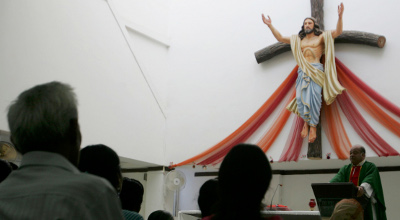Global Action Equips Uneducated Church Planters
In many areas of the world, pastors don’t have an opportunity to attend high school, much less seminary.
Indeed, ministry training choices are not an option for most pastors in foreign nations—especially pastors who live in poor and remote areas, according to Phil Long, president of Global Action.
“Sixty-two percent of the world’s pastors have no formal training and will probably never get any formal training from Bible school,” Long says. “A lot of these pastors have less than a sixth grade education.”
Determined to change that, however, Global Action created GLOMOS: the Global Module Studies program. GLOMOS is specifically designed for pastors who have never had any formal training—and offers them equipping in a way they can grasp. In just 10 months, teachers from all over the globe lay out the basics of seminary, including church history, New and Old Testament surveys, Bible interpretation classes and more. Global Action has taken GLOMOS to India, Nepal, Sri Lanka, Ukraine and Latin America, and hopes to begin programming in Africa as well.
“We have heard testimony after testimony after testimony of people who are trained and either have planted or [are planting] churches that reach hundreds of thousands of people over the last 10 years,” says Long.
The ministry goes even deeper than just training with many pastors, though. Pastors committed to planting a church can find sponsorship through Global Action’s “I Started a Church” program. Lack of funds can be extremely prohibitive to start-up churches in poor areas, so the “I Started a Church” program allows individuals and churches to come alongside these plants for just $50 a month for three years.
The financial commitment for the first year pays for pastors to be trained through GLOMOS.
The second year commitment helps with church basic needs. For instance, Long says, one house church in India grew large enough that it had to start meeting in a cow barn. A gift as small as a plastic chair or a guitar can be significantly helpful to a church with nowhere to sit and no instruments for worship. The second year commitment helps with some of those basics that Western churches tend to take for granted. The third year helps the new church reach out to the community through Christian literature or passing out warm blankets in cold weather.






































